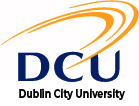BA in Journalism
Key Points
As a future journalist, you have a deep sense of curiosity about the world and the ability to analyze and reveal how things work through clear, concise, and engaging stories. You have the ability to absorb large amounts of information quickly, connect the facts to the big picture, and work to the deadline. You’re excited about the prospect of learning to tell stories on a variety of platforms, from social media to mobile devices and broadcasts.
You can find a journalism niche that suits most interests. In all areas of life, from business to politics, from culture to religion, from sports to lifestyles, the public seeks context in journalism. Your goal will be to inform, but it can also be to entertain or educate.
DCU’s Journalism degree focuses on three essential aspects: practical skills such as video, audio and writing for different platforms (digital, social, print and broadcast); knowledge of people, institutions and ethical principles necessary as a context; and academic studies of law, politics and society to sharpen your critical thinking.
Program description
The BA in Journalism offers some scope of specialization with optional modules, but each student takes the same wide range of core modules in their three years.
An essential element of the final year of the course is an eight-week placement with a media organization where you will test your skills in the world of work. Every journalism student must complete a relevant job placement organized or approved by DCU.
You will explore a theoretical understanding of communication, media and society while learning to engage in storytelling on multiple platforms.
Take advantage of the production modules in social networks, mobile, audio, images and video.
Participate and contribute to the oldest Bachelor of its kind in Ireland, with a reputation for academic and creative excellence.
Learn from staff with professional experience in the fields of social, digital, broadcast and print media, academic research, and teaching.
Experience work life through an eight-week internship at a media organization.
Career options
Brexit, climate change, political unrest, social networks, Internet 2.0, automation and Artificial Intelligence. Organizations and businesses must be highly adaptable and innovative to survive and ultimately thrive in such a dynamic environment. With this in mind, the research highlights an urgent need for graduates who are future-focused, problem solvers, critical thinkers, excellent communicators, highly digitally literate, ethically aware, as well as thoughtful and empathetic.
Driven by an applied mindset, the Bachelor of Social Sciences and Cultural Innovation explicitly addresses these competencies, ensuring that our graduates develop and demonstrate the skills and attributes that are highly sought after by employers. The unique combination of key transferable skills and discipline-specific experience ensures that our graduates will be equipped to forge their own unique career paths in an increasingly imprecise job market and in a variety of sectors.
In addition, graduates of this program are well positioned for postgraduate study in multiple disciplines related to the humanities and social sciences (for example, multimedia, social innovation, journalism, international relations, sustainability, corporate social responsibility, strategic management, marketing and human resources).
Some of the many areas in which our graduates can pursue careers include:
- Communications
- Public relations
- Media production
- Marketing and advertising
- Online media
- National and international political institutions
- Public or state bodies and public function
- Think-tanks, consultancies and pressure groups
- Policy and sustainable development
- Corporate social responsibility
- Social enterprises
- Non-governmental organizations
- Cultural and creative industries
Program structure
Admission requirements
- As a general requirement, a Bachelor’s Degree / Baccalaureate Diploma / General Baccalaureate / Professional Degree from a recognized university with, minimum, is required a subject in mathematics.
- For international candidates, the foreign equivalent is required. In addition, an officially translated degree will be required.
- IELTS 6.5, with no less than 6.0 in any component (or its internationally recognized equivalent).
Learn more about our educational offer
Request your quote
An advisor will contact you by phone and email within the following hours

